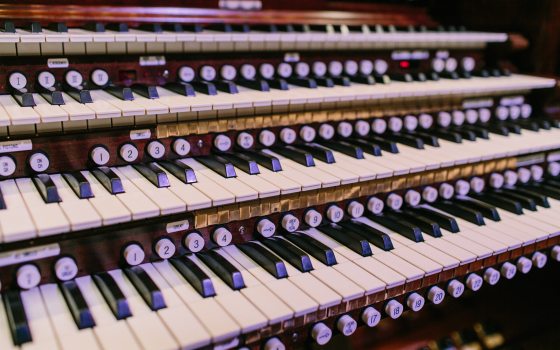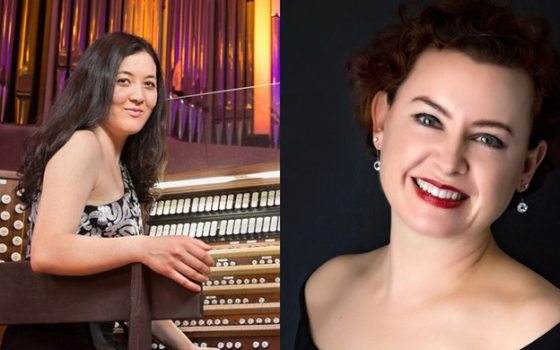Editor’s Note: Simon Johnson is the Master of Music at Westminster Cathedral in London, where he is responsible for directing its world-famous choir. Prior to his September 2021 start at Westminster Cathedral, for 13 years Johnson served as the Organist and Assistant Director of Music at St. Paul’s Cathedral, where he was involved in all national occasions that took place at St. Paul’s during this time there, playing for Her Majesty the Queen, the Dalai Lama, and numerous Prime Ministers and Archbishops. An active recital schedule takes him regularly to the United States, as well as to many of the great venues in Europe. Johnson will soon travel to Longwood to serve as head judge of the 2023 Longwood Gardens International Organ Competition—during which 10 bright young talents will compete on the Longwood Organ—one of the organ’s largest Aeolian pipe organs—before a panel of esteemed judges in a quest for the largest cash prize of any organ competition in the world.
As the head judge for the upcoming 2023 Longwood Gardens International Organ Competition, I'm very much looking forward to being at Longwood Gardens—it is such a beautiful, iconic location and the competition will be a gathering of some brilliant musicians. Crucially, we'll all be doing a lot of thinking purely about music, away from the distractions of everyday life and work. The competitors have a tremendous amount of freedom in the choice of pieces and so there is the potential for much creativity in planning an overall programme for each round. That's exciting as there will be such a variety of approaches and we'll be listening to a wide range of music and styles. It also allows every competitor to present works that reveal something about them as performers and human beings.
I've heard so much about the Longwood Organ and can't wait to hear it live. It will offer endless flexibility in the chosen repertoire, and will be wonderful in conjuring up symphonic palettes. The crucial thing, though, is for the musician to shine through, as well as with, the instrument. The jury will be looking for outstanding, inspiring, spontaneous, and transcendental musicianship from the competitors. That's not too much to ask, is it?! The fact that the music is being played on an organ should be neither here nor there. Obviously that requires technical fluency and flawless organ management, but these things should be barely noticeable. I mentioned the flexibility available in the repertoire choices, but that freedom is also constrained by the need to present cohesive and balanced overall programmes for each round (also by the clock, of course) and that will be a key consideration.
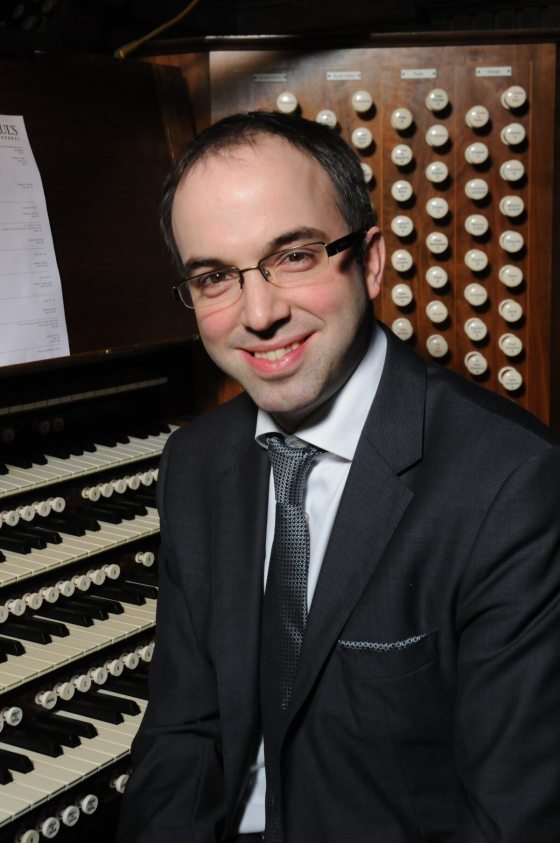
2023 Longwood Gardens International Organ Competition Head Judge Simon Johnson. Photo provided by Simon Johnson.
For the Preliminary Round, each competitor must start their selections with a Max Reger transcription of a work by Johann Sebastian Bach. The Bach/Reger element is an interesting one, requiring the competitors to get in to the mind of not just one but two great composers at the same time, as well as having an understanding of the sound world of the German Romantic organ and translating that to the Longwood instrument. How much Bach, how much Reger?
Both the Preliminary and Final Rounds require the competitors to choose a “lyrical” piece and that will be very revealing for the jury. We are hoping for poetic, imaginative, beautiful cantabile playing that expresses both the performer's inner self and something deep about the music. As a choir director and singer as well as an organist, the horizontal aspect of music is very, very important to me. The musical shaping of phrases is one of the most significant things that an organist must achieve and there is a fine balance to be found. Sometimes we overshape in order to project; at other times we can miss an opportunity to be musical. It is likely that decisions about these nuances will have a bearing on the final placings. But so too will interpretative deliberations about the overarching whole, the “shape around the shapes”, if you like. Organists are amazingly well-placed to see the big picture in music; as Widor said: "The organ speaks like a philosopher."

Composed of 10,010 pipes divided into 146 ranks, the Longwood Organ is the largest Aeolian organ ever constructed in a residential setting. Photo by Ron Lidondici.
Organ transcriptions—pieces written for other instruments, but played on the organ—serve as an integral component of the Longwood Gardens International Organ Competition … and the transcription elements of the competition will be really fascinating. There are so many decisions for the competitors to make and each one is vital. Amongst the myriad questions they must ask themselves: Recreation of the orchestral score or a reimagining for the organ? Where to compromise? Where/how to spring an illusion? Technical pyrotechnics or overarching musical purpose (or both)? How complex a registration plan? And all these things need to be considered within the light of my previous comment about musicianship needing to be the utmost consideration.
I'll be interested in what transcriptions the competitors choose to play: does the organ reveal something new in the music, either through the personality of the performer or because it has a valid place as a transferal on other grounds? In other words, why transcribe, and why this transcription? There are other challenges with the transcription aspect too: the Longwood Organ may be a relatively unfamiliar instrument to the competitors and practice upon it is limited. I sometimes spend weeks figuring out how to register transcriptions and performances gradually emerge, but that luxury of time isn't available to our competitors, so the calm, strategic, long-view thinking of well-rounded musicians will probably prevail.
Alongside all this there is also the purist question of whether we should be playing transcriptions—once a frowned-upon trend—at all. It's an overwhelming “Yes” from me. When asked if his Symphony in D minor meant anything, César Franck said "No, it is just music", and good music also stands on its own, no matter who or what is playing it. Good musicians must be exposed to good music in order to perfect their craft. And maybe they can also bring the experience of playing transcriptions to bear in other repertoire. Often the best organists have at least one foot firmly planted in a wider musical context. They will have an active appreciation of, say, the music of Wagner as they prepare a piece of Franck or of the symphonic music of Brahms as they think about a piece like the Elgar Organ Sonata.
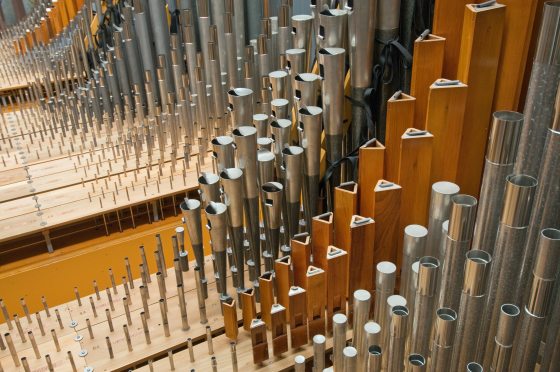
Here, a look at just a few of the 10,010 pipes of the Longwood Organ. Each pipe plays only one note, corresponding to one key on the keyboard. The smaller the pipe, the higher the pitch. Some pipes are made of metal, others of wood. They are held in place by holes in wooden racks below which they sit on wooden chests of pressurized air. Photo by Larry Albee.
If I had to pick one skill that will be absolutely key for the competitors it is their ability to listen, both to the sounds of the organ itself and to the connections between notes. Without wishing to state the obvious, a characteristic of the organ is the facility by which notes can be sustained indefinitely. This places great responsibility on the organist in knowing not only when a note should start, but also when it should finish. The release of the note is just as important as the attack. And just as the middle of a word consists of vowels—the vocalised part of the word—so the organist must find the optimum way to allow the middle of notes to connect to one another. The organist may be covering many lines or chords at any given time and the attacks, releases, legato (enjoinment) may be simultaneous or different at any moment in a piece of music. This is something that is studied, yes, but which is also to do with the organist’s ability to listen and react. It should become instinctive and malleable around each individual piece of music and each instrument, but not to the detriment of the overall musical architecture.
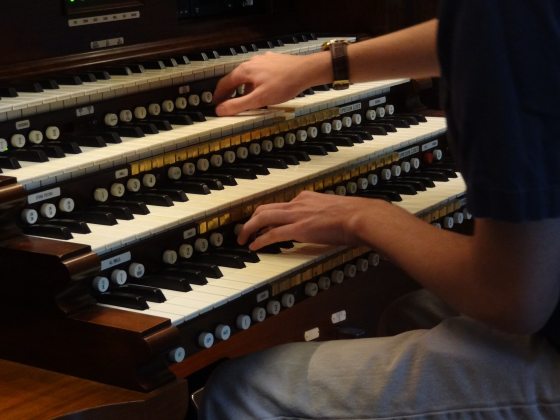
The Longwood Organ awaits the next Longwood Gardens International Organ Competition, taking place June 20 and 21 (Preliminary Rounds) and June 24 (Final Round). Photo by Fred Zwiebel.
Given the organ, location, and repertoire, the Longwood Gardens International Organ Competition is completely unique. There is also some very good prize money on offer. That is important because—perhaps—it might buy the winners some time to make good decisions about their future. If I could do it all again, I'd take more time to grow at the beginning of my career. I couldn't do that at the time because I was flat broke!
On behalf of all the jury, I'd like to wish all the competitors the very best wishes for their preparations and performances. The best piece of advice for them at this stage? Don't forget to enjoy it.
Editor's note: Join us for the 2023 Longwood Gardens International Organ Competition, with Preliminary Rounds on June 20 and 21 and the Final Round on June 24; tickets are available. Guests are also invited to attend the free lecture Making a Comeback: Organ Transcriptions, during which a selection of our judges will discuss the history of organ transcriptions, why this once-frowned-upon trend is becoming popular once more, and how the use of transcriptions within the Longwood Gardens International Organ Competition’s repertoire sets the competition apart.
Can’t be here to experience the competition in person? Tune in to our competition livestream.
